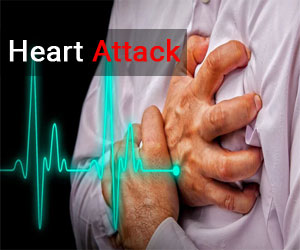- Home
- Editorial
- News
- Practice Guidelines
- Anesthesiology Guidelines
- Cancer Guidelines
- Cardiac Sciences Guidelines
- Critical Care Guidelines
- Dentistry Guidelines
- Dermatology Guidelines
- Diabetes and Endo Guidelines
- Diagnostics Guidelines
- ENT Guidelines
- Featured Practice Guidelines
- Gastroenterology Guidelines
- Geriatrics Guidelines
- Medicine Guidelines
- Nephrology Guidelines
- Neurosciences Guidelines
- Obs and Gynae Guidelines
- Ophthalmology Guidelines
- Orthopaedics Guidelines
- Paediatrics Guidelines
- Psychiatry Guidelines
- Pulmonology Guidelines
- Radiology Guidelines
- Surgery Guidelines
- Urology Guidelines
One-third of patients of severe sepsis at risk of Heart attack,Stroke

One-third of patients admitted with severe sepsis developed cardiovascular disease including heart attack, irregular heartbeats or stroke. These are the findings of a new study published in the American Journal of Cardiology.
UAB’s Nirav Patel, M.D.and colleagues from the University of Alabama at Birmingham designed and conducted the study to assess the incidence, or new onset, of cardiovascular disease and in-hospital deaths in patients hospitalized with severe sepsis, a clinical syndrome related to infection and organ dysfunction. The findings show that the frequency, characteristics and outcomes of patients with severe sepsis who develop cardiovascular events are not well-known due to a lack of large epidemiologic studies in this population.
“Sepsis has been recognized as an important cause of cardiovascular morbidity and mortality in the United States,” he said. “However, there is a lack of comprehensive exploration on new onset of cardiovascular disease and its impact on in-hospital deaths among adults with severe sepsis.”
Sepsis is a systemic inflammatory response to known or suspected infection. Severe sepsis is a form of sepsis that further involves organ dysfunction. Utilizing the “big data” from the New York State Inpatient Database, Patel and investigators from UAB summarized the incidence of cardiovascular disease and hospital deaths among patients admitted with severe sepsis.
As part of the study, researchers conducted a population-based assessment of incident cardiovascular events occurring in patients with severe sepsis and the effect of these cardiovascular events on in-hospital mortality.
Researchers have found nearly one-third of patients admitted with severe sepsis developed cardiovascular disease. Irregular heartbeats were the most common type of cardiovascular disease, followed by a heart attack or stroke and acute heart failure. Increasing age, white race, male sex, history of heart failure and an increasing number of organs’ dysfunction were important factors related to new onset of cardiovascular disease in patients with severe sepsis. The occurrence of cardiovascular disease in the setting of severe sepsis was linked with 29 percent higher odds of in-hospital deaths.
Authors highlighted a high burden (approximately 32 percent) of new-onset cardiovascular disease and a significant death risk (29 percent) attributable to cardiovascular disease in severe sepsis.
“The inflammatory response to severe infection in sepsis results in physiologic, biologic and biochemical dysfunction, which may lead to an increase in the risk of cardiovascular disease,” said senior author Pankaj Arora M.D., an assistant professor in UAB’s Division of Cardiovascular Disease. “Current critical care and cardiology societal guidelines from the International Guidelines for Management of Sepsis and Septic Shock, American College of Cardiology, and American Heart Association lack specific recommendations for surveillance and treatment on new onset of cardiovascular disease in sepsis.”
Arora says he sees patients admitted with severe sepsis in intensive care units develop new-onset cardiovascular manifestations frequently, but the cumulative burden has not been well-characterized in the past. Moreover, in-hospital mortality in severe sepsis has not declined in the last few decades. Arora says their work highlights the need for sepsis treatment protocols to be tailored for early recognition and prompt treatment of cardiovascular manifestations.
Arora also emphasizes the need for detailed investigations of cardiovascular physiology in severe sepsis to target specific therapeutic strategies to avoid new onset of cardiovascular disease and, subsequently, reduce deaths.
For more details click on the link: https://doi.org/10.1016/j.amjcard.2019.01.038

Disclaimer: This site is primarily intended for healthcare professionals. Any content/information on this website does not replace the advice of medical and/or health professionals and should not be construed as medical/diagnostic advice/endorsement or prescription. Use of this site is subject to our terms of use, privacy policy, advertisement policy. © 2020 Minerva Medical Treatment Pvt Ltd